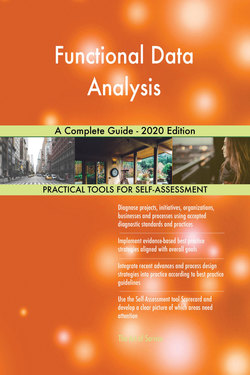Читать книгу Functional Data Analysis A Complete Guide - 2020 Edition - Gerardus Blokdyk - Страница 2
На сайте Литреса книга снята с продажи.
ОглавлениеINCLUDES LIFETIME SELF ASSESSMENT UPDATES
Every self assessment comes with Lifetime Updates and Lifetime Free Updated Books. Lifetime Updates is an industry-first feature which allows you to receive verified self assessment updates, ensuring you always have the most accurate information at your fingertips.
Get it now- you will be glad you did - do it now, before you forget.
Send an email to access@theartofservice.com with this books’ title in the subject to get the Functional Data Analysis Self Assessment Tool right away.
Purpose of this Self-Assessment
This Self-Assessment has been developed to improve understanding of the requirements and elements of Functional Data Analysis, based on best practices and standards in business process architecture, design and quality management.
It is designed to allow for a rapid Self-Assessment to determine how closely existing management practices and procedures correspond to the elements of the Self-Assessment.
The criteria of requirements and elements of Functional Data Analysis have been rephrased in the format of a Self-Assessment questionnaire, with a seven-criterion scoring system, as explained in this document.
In this format, even with limited background knowledge of Functional Data Analysis, a manager can quickly review existing operations to determine how they measure up to the standards. This in turn can serve as the starting point of a ‘gap analysis’ to identify management tools or system elements that might usefully be implemented in the organization to help improve overall performance.
How to use the Self-Assessment
On the following pages are a series of questions to identify to what extent your Functional Data Analysis initiative is complete in comparison to the requirements set in standards.
To facilitate answering the questions, there is a space in front of each question to enter a score on a scale of ‘1’ to ‘5’.
1 Strongly Disagree
2 Disagree
3 Neutral
4 Agree
5 Strongly Agree
Read the question and rate it with the following in front of mind:
‘In my belief,
the answer to this question is clearly defined’.
There are two ways in which you can choose to interpret this statement;
1.how aware are you that the answer to the question is clearly defined
2.for more in-depth analysis you can choose to gather evidence and confirm the answer to the question. This obviously will take more time, most Self-Assessment users opt for the first way to interpret the question and dig deeper later on based on the outcome of the overall Self-Assessment.
A score of ‘1’ would mean that the answer is not clear at all, where a ‘5’ would mean the answer is crystal clear and defined. Leave emtpy when the question is not applicable or you don’t want to answer it, you can skip it without affecting your score. Write your score in the space provided.
After you have responded to all the appropriate statements in each section, compute your average score for that section, using the formula provided, and round to the nearest tenth. Then transfer to the corresponding spoke in the Functional Data Analysis Scorecard on the second next page of the Self-Assessment.
Your completed Functional Data Analysis Scorecard will give you a clear presentation of which Functional Data Analysis areas need attention.
